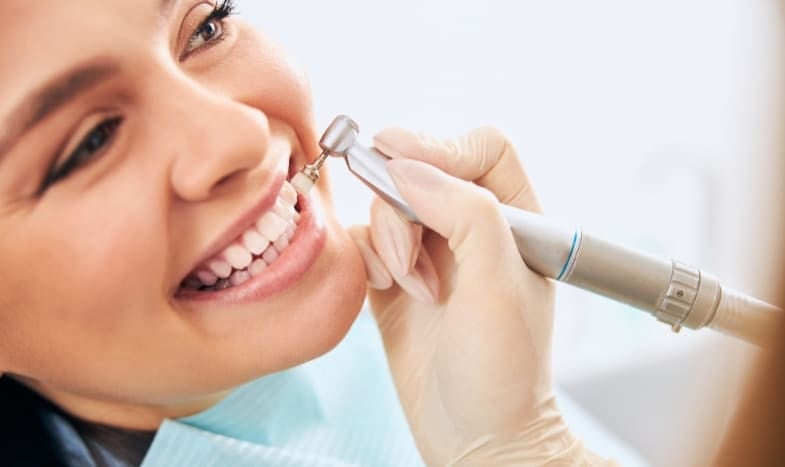A bright, confident smile is a goal for many, and while teeth whitening treatments have grown in popularity, some wonder if a routine professional cleaning can achieve the same results. For those considering Teeth Cleaning in Dubai, it’s important to understand the differences between cleaning and whitening, their benefits, and how each impacts the appearance and health of your teeth. While dental cleanings play a critical role in oral health, they are not a direct substitute for professional whitening procedures. Knowing what each can do helps you make informed decisions about maintaining a healthy and radiant smile.
How Professional Teeth Cleaning Works:
Teeth cleaning is primarily focused on removing plaque, tartar, and surface stains that accumulate over time. During a cleaning session, a dental professional uses specialized tools to polish and scrub teeth, targeting areas that are difficult to reach with regular brushing. This process prevents decay, supports gum health, and can enhance the natural brightness of teeth, but it does not chemically alter the color of the enamel like whitening treatments do.
Understanding Teeth Whitening:
Teeth whitening treatments are designed to lighten the natural color of teeth beyond their original shade. These procedures typically involve bleaching agents such as hydrogen peroxide or carbamide peroxide, which penetrate the enamel to remove deeper stains caused by food, beverages, smoking, or aging. Unlike routine cleaning, whitening can create a dramatic change in tooth color within a short period, giving the “Hollywood smile” effect many patients desire.
Surface Stains vs. Deep Stains:
One key difference between cleaning and whitening is the type of stains they address. Professional cleanings effectively remove surface stains caused by tea, coffee, or plaque buildup, whereas deeper discoloration embedded in the enamel requires whitening treatments. For patients with mild staining, regular cleanings may noticeably brighten teeth. For more persistent or intrinsic stains, whitening is often necessary to achieve the desired shade.
Benefits of Teeth Cleaning Beyond Whitening:
While cleanings may not replace whitening, they offer a host of other advantages:
- Prevents plaque and tartar buildup
- Reduces the risk of gum disease
- Strengthens tooth enamel
- Freshens breath
- Supports long-term oral health
- These benefits make professional cleanings essential for maintaining overall dental wellness and the foundation for any cosmetic enhancement.
When Whitening May Be Necessary:
Patients seeking a brighter smile that surpasses their natural tooth color will likely require professional whitening. Whitening treatments can be customized to achieve different shades and are especially useful for eliminating stubborn discoloration caused by smoking, certain medications, or aging. Consulting with a dentist ensures safe and effective results without harming the enamel or gums.
Combining Cleaning and Whitening for Best Results:
For optimal results, many dental professionals recommend combining routine cleaning with whitening treatments. Cleanings remove surface buildup that can interfere with bleaching agents, allowing the whitening treatment to work more effectively. This combination ensures not only a brighter smile but also healthier teeth and gums.
Limitations of At-Home Whitening Products:
Over-the-counter whitening products may seem convenient, but they often provide inconsistent results and cannot replace professional care. Without a prior cleaning, stains may not lighten evenly, and sensitive teeth or existing dental issues can worsen. Professional cleanings ensure teeth are in optimal condition before any whitening procedure, reducing the risk of complications.
Maintaining Results Long-Term:
Regardless of the method used to brighten teeth, maintaining results requires regular care. Routine professional cleanings every six months, along with good oral hygiene practices, help preserve the appearance and health of teeth. Avoiding staining foods and beverages, quitting smoking, and using dentist-approved whitening touch-ups can extend the lifespan of a brighter smile.
The Role of Lifestyle Factors:
Lifestyle choices significantly influence tooth color and overall dental health. Regular cleanings help manage the effects of coffee, tea, and other staining foods, while whitening addresses discoloration already present. Combining healthy habits with professional care creates a sustainable and natural-looking smile that remains vibrant over time.
Cost Considerations:
Professional cleanings are generally more affordable than whitening treatments and are often covered by dental insurance plans. Whitening procedures, especially in-office treatments, may involve additional costs, but the dramatic results often justify the investment for patients seeking a noticeably brighter smile. Discussing options with your dentist ensures a plan that balances budget and aesthetic goals.
Final Thoughts:
While professional Teeth Cleaning in Dubai can remove surface stains and improve the natural brightness of your teeth, it cannot fully replace whitening procedures for deeper or more stubborn discoloration. Cleanings are essential for oral health, removing plaque, tartar, and bacteria that could lead to decay and gum disease. For those seeking a truly radiant smile, combining regular cleanings with professional whitening offers the best results—ensuring both health and aesthetic appeal. Ultimately, maintaining a healthy, bright smile involves understanding the complementary roles of both dental cleaning and whitening, along with consistent oral care and lifestyle management.

